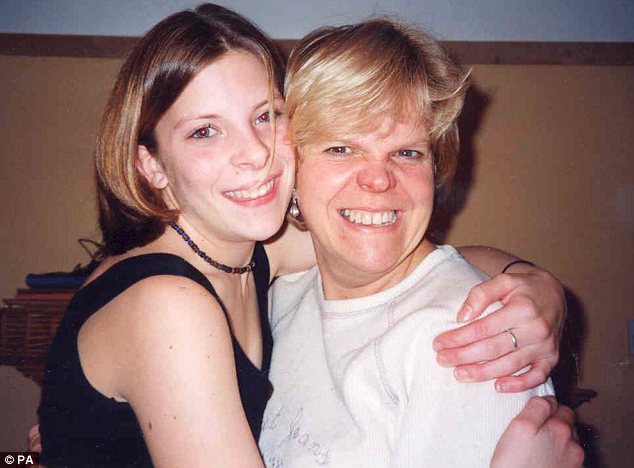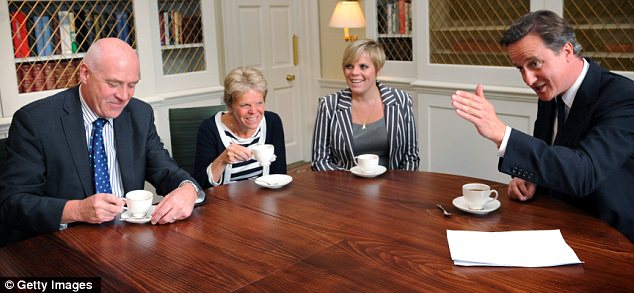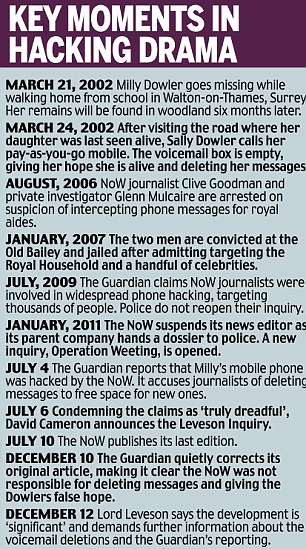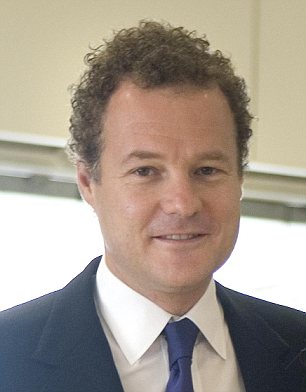|
Scotland Yard yesterday said it has absolutely ‘no evidence’ that News
of the World journalists deleted Milly Dowler’s voicemail messages.
The police force’s barrister made a dramatic intervention at the Leveson
inquiry into press standards.
Neil Garnham QC said the ‘most likely explanation’ for the disappearance
of the messages is that they automatically ‘dropped off’ the network
after 72 hours.
 |
|
The doting
mother: Sally Dowler, pictured with her daughter Milly, has
spoken of the false hope she felt when she discovered that
messages had been deleted from Milly's voicemail |
It was the toxic claim that journalists deleted the messages – giving
Milly’s parents hope that she might be alive – which provoked a public
outcry, brought about the closure of the Sunday tabloid and led to David
Cameron establishing the media standards inquiry.
Mr Garnham also revealed that, since the bombshell story appeared in the
Guardian in July, police had been blocked from contacting the Dowler
family to explain how part of it might have been incorrect.
He continued: ‘I can say that the Metropolitan Police did not tell the
Dowlers that voicemails had been deleted for the simple reason that they
did not know of any such deletions.’
The new developments appear to undermine one of the foundation stones of
Lord Justice Leveson’s mammoth task just weeks after it began and
yesterday the judge himself admitted the ‘significant’ revelations go to
the very root of the reason for his wide-ranging review.
They also appear to explode the myth that the Sunday paper’s journalists
were routinely deleting messages. Lord Justice Leveson said: ‘It strikes
me that this information is of significance, bearing in mind the
importance of the original announcement in the context of the setting up
of this inquiry.’
He also suggested Surrey Police officers might have to appear before his
inquiry to throw light on what happened to the voicemails in the days
after 13-year-old Milly disappeared.
Last night Tom Latchem, a former News of the World reporter, said: ‘This
allegation [that reporters deleted the voicemails] really made me feel
sick. I thought, “Why am I working for a company that would fund the
hacking of a mobile and deletion of messages adding to the pain of an
already suffering family?” To find out this isn’t true makes me feel
bad.’
The Metropolitan Police is leading the criminal investigation into phone
hacking, Operation Weeting. Its QC Mr Garnham spoke out following the
publication of stories at the weekend that the deletions might not have
been carried out by News of the World journalists.
He said police now believed it was ‘unlikely’ that the messages were
deleted by Glenn Mulcaire, the private investigator who worked for the
News of the World. He has denied erasing the messages and police have
evidence which suggests the newspaper did not ask him to work on the
Dowler case until later, the inquiry heard.
Mr Garnham said officers on Operation Weeting had no evidence that other
journalists from News International, the owners of the News of the
World, had deleted Milly’s voicemail.
Lawyers acting for phone hacking victims, including Bob and Sally Dowler,
insisted they had evidence that News International had accessed her
messages.
 |
|
Family:
The Dowlers had a meeting with David Cameron after the
hacking allegations first came to light |
However Mr Garnham also revealed that Met Police Service officers had
wanted to brief the Dowlers about their theory that the messages were
automatically deleted. He told the inquiry: ‘The MPS wanted to speak to
Mr and Mrs Dowler to provide them with this information. They spoke to
the Dowlers’ solicitor, Mark Lewis.
‘Mr Lewis thanked the MPS for the approach but indicated that the
Dowlers would prefer not to be spoken to by police at this stage.’ Mr
Garnham said police could not yet provide ‘a comprehensive explanation’
for how Milly’s voicemail messages were deleted.
But he added: ‘It is conceivable that other News International
journalists deleted the voicemail, but the Metropolitan Police Service
have no evidence to support that proposition and current inquiries
suggest that is unlikely.
‘The most likely
explanation is that existing messages automatically dropped off from the
mailbox after 72 hours
|
TESSA JOWELL'S HACKING PAYOUT
|
|
Former Cabinet minister Tessa Jowell has accepted £200,000
in damages after her phone was targeted by the News of the
World in 2006 when her estranged husband was mired in
controversy over his links to Silvio Berlusconi |
The relevant phone network provider has confirmed that this was a
standard automatic function of that voice mailbox system at the time.’
He also pointed out that the Dowlers had not told the Leveson inquiry
that journalists were responsible for the deletions.
The crucial article in the Guardian on July 5 said officers from Surrey
Police, which led the original Dowler investigation, were ‘concerned
about how News of the World journalists intercepted and deleted
voicemail messages of Milly Dowler.’
The article said journalists had erased messages to make space for more
messages, leading friends and family of the missing girl to believe she
could be alive.
Mr Garnham said police did not know where the Guardian had got its
information, adding: ‘That matter is the subject of further
investigation.’
Guardian journalist Nick Davies, who wrote the story, was defiant last
night. He dismissed as ‘delusional’ critics who said the claims about
the deletion of voicemails were a key factor in the demise of the
newspaper.
He said: ‘The new evidence confirmed almost everything I had reported in
July of this year. But one important element shifted: the police could
no longer be sure exactly who had caused the particular deletions that
led to that “false hope” moment.’
|
WHY BRITAIN NEEDS A STRONG PRESS, BY MAIL CHAIRMAN |
|
By
MICHAEL SEAMARK
Britain
needs a financially viable and editorially independent press
to protect and benefit society, MPs and peers heard
yesterday.
This is
in everyone’s interest, said Viscount Rothermere (right),
chairman of Daily Mail and General Trust – publishers of the
Daily Mail.
Giving
evidence to the Joint Committee on Privacy and Injunctions,
he was asked whether the publishing of private information
played an important part in a newspaper’s viability.
He said:
‘I believe certainly that the newspaper industry does a lot
of good for people in this country. It raises a lot of
causes, raises a lot of money for charity and seeks out and
exposes corruption. So yes, it has to have a financially
viable model.’
The
committee, comprising 13 MPs and 13 members of the House of
Lords, was set up by David Cameron in May to see whether the
law should change amid a row over the growing number of
privacy rulings and the use of injunctions.
Lord
Rothermere said there was a view that the pendulum had swung
too far and become too restrictive, but he added: ‘I have
faith in the judiciary.’ He was asked whether the
disappearance of Madeleine McCann in Portugal in May 2007
and the subsequent newspaper coverage had caused him
concern.
Lord
Rothermere told the committee: ‘My papers write about many
things that give me personal cause of concern but I feel
it’s my duty to allow the editors their job to edit and if I
picked up the phone every single time I disagreed with an
article then I think their job would become an awful lot
harder to do.
‘I am
very deeply sympathetic to everything the McCanns have gone
through.’
He said
he trusted his editors and it was not his role as proprietor
to interfere. ‘It is our job to stand back and fiercely
defend their independence. We believe we make the best
newspapers we can by allowing our editors editorial
freedom.’
Lord
Rothermere said he thought the Press Complaints Commission
has done a good job although ‘there are areas for
improvement’.
He
defended the presence of newspaper editors on the
self-regulatory body ‘in the same way that the BMA has
doctors on its council’.
Asked
when standards are an issue to a proprietor, he replied: ‘I
care about standards – standards are important.’
|
|






